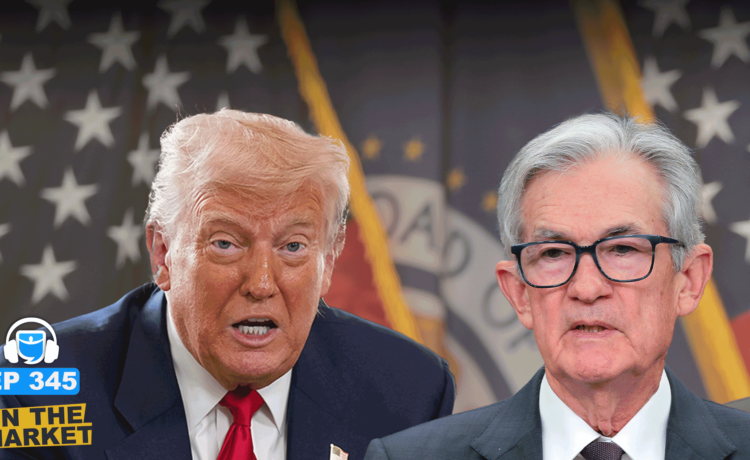Could President Trump’s battle with Jerome Powell and the Federal Reserve over interest rates actually lead to higher mortgage rates instead of the lower rates Trump is pushing for? On The Market host Dave Meyer explores how Trump’s challenge to Fed independence might backfire (hint: bond investors don’t like it) and the economy-wide implications for uncertain rates in the near future. This is a must-know topic for anyone accounting for future mortgage rates in their current investing strategy.
Dave:
President Trump wants a 1% federal funds rate, but could his big feud with Jerome Powell backfire and actually result in even higher mortgage rates in the next few years? If you’ve been trying to sift through the drama and just want to know where rates could be headed in 2026 and beyond. Today we’re digging into Trump versus the Fed. Hey everyone, welcome to On the Market. I’m Dave Meyer. If you’ve been watching the news recently, you probably notice the feud between President Trump and the Fed Chair Jerome Powell starting to escalate. The basic points here are that Trump wants lower interest rates, but the Fed hasn’t cut rates since 2024 due to a strong labor market and fears of inflation. Trump has even speculated because of this rift about firing Powell or at least replacing him when his term ends next year. But this isn’t just any old feud regardless of how it ends, just the fact that it’s going on could send shockwaves through the financial system and could directly impact mortgage rates and potentially not in the way Trump and many real estate investors want to see.
So this is a really important topic and today we’re going to explore what this fight is all about and how it could wind up impacting you. I’m going to start with a very quick two minute overview of what the Fed is and how it works, and then we’ll talk about interest rates and whether Trump can actually achieve the cuts that he wants. So the Fed is actually short for the Federal Reserve. It’s the Central Bank of the United States. It was created way back in 1913 and its most basic job is to stabilize the financial system and the economy, and it primarily does this through controlling interest rates, which is known as monetary policy. Now, this is different than fiscal policy that lies in the hands of Congress, basically how much money we’re spending. The Fed doesn’t control that. They basically control interest rates and a couple other things.
Now, the Fed has two missions from Congress. You probably have heard this called the dual mandate for the Fed on one hand is what they call price stability. It’s basically controlling inflation. They want to make sure prices don’t go crazy due to an overheated economy or printing too much money or the other sources of inflation. On the other hand, they are responsible for trying to maximize employment, which is basically trying to get the economy to grow as much as possible. And these two things, as we’ve talked about in the show many times are sometimes at odds. It is difficult to get an economy that is growing really well but isn’t producing inflation. And so the Fed’s job is to achieve the right balance. And again, they do that primarily through controlling interest rates. Now the Fed is actually this big entity. There’s all sorts of banks all over the country, but when we talk about the Fed, quote unquote in the news or on the show, what we’re talking about is actually the Board of Governors.
These are the people who make the decisions about interest rates. And in the news today, we hear a lot about Jerome Powell because he is the chairman of the board. He is the main person, he’s the figurehead for the Fed, but there are actually seven members of the Fed Board. They’re appointed by the president and they’re confirmed by the Senate. Jerome Powell was actually appointed by Donald Trump in 2017 during his first term. This obviously makes the drama a little bit more intriguing. He was then reappointed by Biden, and that term is up in May of 2026, which we’ll come back to in a little bit. So those are the basics of the Fed, but we need to talk about this other thing called Fed independence because this is what’s really coming into focus right now and these questions about Fed independence might be driving mortgage rate activity in the future.
So we do need to dive into this. Fed independence refers to the idea that the central bank in the US that’s the Fed should operate free from short-term political pressures, especially in this monetary setting role that they have. The idea is that this allows the Fed to make decisions based on economic data and long-term goals, not what’s going on politically at the time. Now, it’s important to understand that doesn’t mean that the Fed has zero accountability. They regularly report to Congress, they’re subject to audits, but generally speaking, when it comes to interest rates and where they should go fed independence, this idea is that policymakers, the president, should be sort of absent for these decisions about interest rates. Now there are of course pros and cons to this. Some people believe strongly in Fed independence. Some people think that elected officials should have more control over monetary policy.
But what I want to talk about today is how this sort of plays out for investors and the importance of Fed independence for specifically bond investors because those are the people who we care about when we’re talking about mortgage rates. First things first, this probably is obvious, but monetary policy really impacts financial markets. I say this a lot and I know no one likes this, but it is true. Bonds rule the world and more specifically, US bonds rule all bonds. So I know it sounds crazy, but US bonds and what goes on with our financial system is sort of the linchpin for the entire global financial system. So the Fed and their policies matter a lot, and it’s not just for mortgage rates, it’s for the entire US economy. One of the main reasons the US gets to borrow so much money to fuel our increasing debt, which is not necessarily a good thing.
But one of the main reasons that the US can do this at a relatively low interest rate is that there is so much demand for US debt and this demand. The reason that international investors, that domestic investors want to lend money to the US government comes from stability and strength. It comes from economic growth and it also comes from an apolitical monetary policy system. The fact that the Fed has some level of independence in their decision-making gives investors long-term confidence in the us. And this is true whether there is a Republican president in place or a Democratic president in place. Generally speaking, you hear this from investors, you hear it from Wall Street bankers, you hear it from a lot of people in the financial system. They support the idea of Fed independence because it provides stability for the financial system. In recent years, Trump has said that he doesn’t like the idea of Fed independence so much and he has stated that he wants to directly impact fed decision-making or at least have a say in it and we’ll get into why and if he can do that, what might happen with all of that right after this break.
Welcome back to on the market. Before the break, we were talking about the concept of Fed independence. Now let’s turn to what Trump thinks about this and his ongoing and escalating feud with the Fed Trump’s feelings about the Fed and its chair. Jerome Powell are very well known. Going back to the campaign in 2024, he said he wants more of a say of what the Fed is doing. And more recently, basically Trump said that he feels the Fed has been too cautious in their monetary policy. He wants them to be lowering rates. Specifically he said the federal funds rate not mortgage rates because that’s not what the Fed controls. The Fed only controls the federal funds rate. Trump said that he feels the federal funds rate should be cut to about 1%. Right now it’s about four and a quarter percent, so that would be a very dramatic cut.
Now, why does President Trump want this? Well, lower interest rates generally provide economic stimulus and he believes that rates should be cut to stimulate the economy to grow. I think specifically he’s looking at the housing market and how sluggish it’s been, and he wants some stimulant for the housing market. And because we have this super high national debt and it’s constantly being refinanced through treasury auctions, he wants lower interest rates because that will lower our payments on the national debt. Now of course, all of those are reasonable things for the president to want, but Jerome Powell and the Fed so far at least have disagreed. Powell and the board of Governors say that he and the Fed are data-driven and they want to see more data about what’s going on with inflation and the economy before cutting rates any further. They’ve specifically pointed to inflation concerns because most economists believe that even though we haven’t seen a huge uptick in inflation over the last couple of months, some of the impacts, most of the impacts I believe, of the tariffs that have been implemented haven’t really worked their way through the economy.
And so the Fed is saying that they want to just wait and see what happens with inflation before cutting rates even further. Last month of data that we had, I’m recording this at the end of July. So the last data we have was for the full month of June. Inflation went up a little bit, not a ton, but I think the Fed is basically saying they want to see if that trend continues. They’ve also pointed to the strong labor market and said that they don’t really need to cut rates right now if the labor market is doing well. And although personally I believe there are signs that there’s cracks in the labor market starting to appear, the Fed apparently does not believe that those cracks in the labor market are significant enough to warrant lowering rates amongst an environment where there could be more inflation.
Now, of course, Trump is not happy with this. He has openly accused the Fed chair Jerome Powell of mismanagement and economic damage. He’s called him stupid, a knucklehead, a major loser. He has said he knows much more about interest rates than Powell does. Recently in the last couple of days, I don’t know if you saw it, there was some political theater with Trump and Powell openly bickering on live tv. And Trump has even gone so far as suggesting Powell should step down or exploring if he could fire him. Now, legally, it’s unclear if Trump could actually fire Powell. Legal scholars sort of differ on this, but what is clear is that he can and almost certainly will replace Jerome Powell in 2026. That’s just when his term is up. And it is the president’s right? It is the president’s job to appoint a Fed chair that will get approved by Congress.
And so Trump, if he doesn’t do anything before May of 2026, he’s almost certainly going to replace Powell with a new chair who’s more aligned with his own beliefs about monetary policy and the idea of Fed independence. So for now, we’re just kind of stuck with this ongoing drama. Now, I should mention, I kind of mentioned this before, but I just want to say that for the most part, bankers, investors, economists, people who think about this stuff a lot are backing the idea of Fed independence. Just in the last couple of weeks, we’ve seen prominent Wall Street types coming out in support of Fed independence. Goldman Sachs, CEO, David Solomon, bank of American, CEO, Brian Moynihan, Citibank, CEO, Jane Frazier, chase, CEO, Jamie Diamond. They all believe independence is better for the economy because it provides stability and these banks need stability and just those four banks alone control $12 trillion in assets.
So they definitely have a stake in this game. So there’s basically three avenues that we can go down right now. Number one, fed could just decide to cut rates and then maybe Trump will back off. I’m recording this on July 31st, though the Fed just met and decided to hold rates steady, but there is a lot of belief. There’s some websites you can go check out with the probability of a rate cut, and most people believe that there will be a rate cut in September. It’s about a 50% chance right now, but that’s probably going to be a 25 basis point cut. And Trump has said that he wants interest rates cuts from four and a quarter down to 1%, so you’d need a 3.25% cut, not a 0.25% cut. So even if they cut in September a little bit, I don’t know if Trump will actually back off, but that is one avenue that could possibly happen is fed policy.
Trump’s desires could actually wind up aligning. The second possibility is the Fed holds firm, maybe inflation comes up a little bit and then this escalates the fight with the Fed. Or the third option is that not much happens and it gets resolved in May, 2026 when President Trump will probably just appoint a new Fed chair. Now to me what matters for investors is not so much what happens with modest cuts, like a 0.25% cut here, half a point cut here. Those things matter. But if you want to look at the big picture, I think the thing that’s coming into question, and the thing I think about the most is just the idea of fed independence. Because even if the Fed does wind up cutting rates, if investors lose confidence in Fed independence, this whole thing could actually backfire and could result in higher rates. That’s right.
I want to make clear what I am saying here. Even if Trump winds up being able to and goes ahead and fires Powell, then the new chair and the new fed cuts rates, lending rates and particularly mortgage rates could actually go up. And this is super important, and I’m not saying this is right or wrong, I just want to explain to you how this could actually work. Mechanically, we talk a lot on the show about how mortgage rates are tied to the bond market, right? Bond markets, again, that is lending money to the US government. And currently there is huge demand for US bonds because we’re the biggest economy in the world. We have great growth long-term, we are really reliable and stable. This is the stuff that bond investors want. If you were buying bonds, wouldn’t you want it to be from a big, strong, stable country or would you rather buy bonds from a really volatile country with a weak government and a lower probability of paying you back?
Personally, I’m picking the big guys and so do most international investors because bonds are a store of wealth. That is their purpose in your overall portfolio and your wealth building, you’re looking for stability and the US provides that. And so because of this stability, the US has a lot of demand for bonds, bond market work like anything else, all of this demand, because we’re so big and stable, keeps our lending rates lower than much of the rest of the world. We are able to borrow for our own debt. And yes, us as real estate investors for our mortgages, we are able to borrow cheaper because we are given a lot of credit by the international finance system. So we get to borrow at relatively lower costs than a lot of other countries. Now that’s pretty great, but the loss of fed independence could threaten that.
And I’m not saying this will definitely happen, but it could threaten that because sure, we will still be the biggest economy in the world. We are far ahead on that and hopefully we’ll keep growing. But the stability and long-term outlook gets a little bit murkier when you lose fed independence. And this isn’t really cool with bond investors because if you think about it, this might be the single most important thing to bond investors. They are lending money to the US government and the most important calculation whether they’re going to lend to the government, how much they’re going to lend at what interest rate is, they want to know that monetary policy is not going to screw them over because inflation is really bad for bond investors. It’s possibly the worst thing for investors. It’s the thing they really worry about because when they lend money to the US government, they are going to be getting interest payments in the future and they want to make sure that those interest payments are worth as much as possible.
But if there’s really high inflation, the value of the dollars they are getting back on those interest payments is actually less. It buys less for them. And so the benefit of lending money to the US government and locking your money up for a long period of time, let’s say you buy a 10 year bond if you are going to lock your money up and give it to the US government for 10 years and all of a sudden the interest payments on that money that you lent to the government is no longer worth a lot of money, that defeats the entire point of getting a bond. So bond investors super worried about inflation, and the point here is that less fed independence raises the risk of inflation. Now, we certainly don’t know what would happen if rates were cut to 1% tomorrow, but it would definitely increase the risk of inflation.
Not saying definite inflation, but the risk, the probability that we get higher inflation would definitely go up. That is pretty hard to argue with. Pretty much all economic data shows that when rates are dropped dramatically, the risk of inflation does go up. So this again is why bond investors do not like the idea of losing independence. They are fearful of inflation. This is very likely why all those Wall Street types are saying that they like the idea of fed independence because they don’t want inflation to go up. We do have to take a quick break, but we’ll be right back.
Welcome back to on the market. We are here discussing fed independence and what it means for real estate investors. So this is basically how the plan from Trump could backfire. Just let’s game it out for a minute. Imagine he fires Powell and the new chair cuts rates to 1% like Trump wants. This will definitely lower short-term interest rates because that’s basically what the federal funds rate controls is short-term interest rates, but there could potentially be some pushback or even a full on revolt in the bond market because investors could see the risk of inflation in longer term bonds like the 10 year, which is the one that’s most important for mortgages, and that could actually push up longer term rates. So shorter term rates, borrowing costs could go down, but long-term borrowing costs could go up. And this isn’t just speculation. This has happened in the US and in other countries.
Much of the inflation and high rates in the US in the 1970s is often attributed by experts to Nixon’s influence on the Fed. And it’s for these reasons. I am personally a proponent of fed independence. Say what you want about the current Fed and Jerome Powell. I think their track record, especially during the pandemic is worthy of criticism, but regardless of what you think of them or really any fed chair, any fed governor, any president, this is not a political comment. I just think that fed independence is an important concept. You all know I study the bond market closely because it really does impact our economy in far more ways than the average person realizes. But since you listen to the show, you probably understand what’s at stake here. Messing with the bond market means volatility for mortgage rates. And even though I want rates to come down as much as the next person, I don’t want to do it at the expense of faith in our bond market, especially given how high our national debt is right now.
And remember, even if rates get cut, that doesn’t mean mortgage rates will fall, which is why I just generally see the pressure on the Fed as risky. Now for investors, you’re probably wondering what this means for all of you. You may have listened to an episode. I think one or two episodes ago I put out a full prediction about mortgage rates for the rest of 2026. I personally believe that mortgage rates are going to stay pretty close to where they are for the remainder of the year, and that’s regardless of whether the fed cuts rates or not. I just think there is too much uncertainty in the economy right now, and that comes from tariffs, that comes from the labor market. And the questions around Fed independence also provide a level of uncertainty that increases overall risk in the system, and that is going to keep bond yields a little bit higher.
And so for me, that means as an investor, I’m going to underwrite deals and plan for rates to remain high. And it’s what I recommend all of you do as well. Now, there is a chance that if Trump replaces Powell in May of 2026 and rates go down, that mortgage rates do go down. That is also a possible outcome if inflation is under control. And if that happens, then buying now is actually a pretty good time because prices are weakening a little bit. And if rates actually do wind up going down six months or a year from now, that could add some juice to the housing market and boost some equity. But personally, I’m not planning on that. I think that the prudent thing to do as an investor is to plan for interest rates for the foreseeable future, for the next year or so to stay in the mid sixes.
There are still deals that work with those rates, and those are the ones that I’m going to pursue. And if rates wind up going down in the future, that’s just great. So that’s my take on Fed independence and what to do about it, but I would love to know what you all think. So let me know in the comments if you’re watching on YouTube or listening on Spotify, or you can always hit me up on Instagram where I’m at the data deli and let me know your thoughts. Thanks for listening to this episode on the market. We’ll see you next time.
Help us reach new listeners on iTunes by leaving us a rating and review! It takes just 30 seconds and instructions can be found here. Thanks! We really appreciate it!
Interested in learning more about today’s sponsors or becoming a BiggerPockets partner yourself? Email [email protected].













